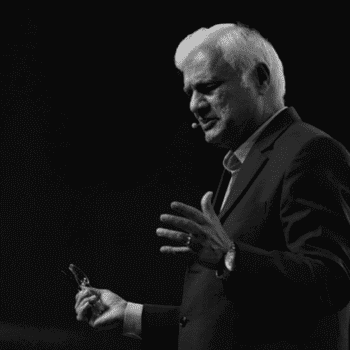Over the years I have written quite a bit on the fall of prominent Christians caught up in various scandals. In the same breath, I have spent a rather decent amount of time calling to attention what would be construed as doctrinal failure from many others. I wrote here on the fall of Mark Driscoll, here on Tullian Tchividjian, here on Art Azurdia, and I have also dialed in on the doctrinal maladies of men like Andy Stanley (here, here, here, and here), here and here on Steven Furtick, here on Francis Chan, and I have written more broadly toward the topic of why Christians are commanded to call out false teachers here.
Most recently though, I wrote a piece on the late Ravi Zacharias, which took a rather large amount of criticism from individuals simply due to weighing in on the allegations shortly after they came out. Truth be told, I have received my fair share of criticism on this topic over the years no matter who I’ve focused upon or when I wrote on the topic. What I want to do today is set the precedent on the fundamental reason behind why I gravitate towards this topic and write on it as I do. In essence, it has everything to do with what it means to meet the qualification of being “above reproach” or “blameless” as Paul dictates in his letters to Timothy and Titus.
The words ἀνεπίλημπτον “above reproach” (1 Tim. 3:2) or ἀνέγκλητος “blameless” (1 Tim. 3:10 with respect to deacons; Tit. 1:6-7) are both what are called “alpha-privatives,” which is simply the grammatical practice of prefixing an “a” to a word in order to negate it, much like in the word “a-theist.” In this, the prefixing of the Greek letter alpha to the words themselves serves to show the antitheses to these qualities is what Paul has in mind (just like in the example above, prefixing the letter “a” to the word “theist” serves to show an atheist is simply one who is not a theist). One who is ἀνεπίλημπτον and ἀνέγκλητος is one who lacks the qualities of the one who conducts themselves in a manner that discredits themselves and their ministry.
Thus, in the simplest of terms, the elder must not bear reproach or blame with regard to their life and doctrine, which they are to guard closely so that they may save themselves and their hearers (1 Tim. 4:6). The overseer’s life must be one which testifies clearly to their singular devotion to Christ and a life which flows out of that devotion to Christ. He must be a man who walks in integrity; he must not be hypocritical, and the reasons for this are fairly straightforward. If one fails here, they undoubtedly will fail in their ability to lead others in following Christ and leading blameless lives in the midst of a perverse and crooked generation (Phil. 2:15). The implications are that one who cannot live up to their own message has no business shepherding others to the obey that message. They need to busy themselves first with obedience to Christ, and then they can rightly instruct the flock in matters of the Christian faith and faithfulness to that body of doctrine.
The idea is not that accusations never come up against the overseer, but rather, the allegations are baseless—they are unable to be substantiated (Acts 25:7; 1 Pet. 3:16). If the qualification to be “above reproach” or “blameless” meant that no accusations could come against the elder, this would disqualify even the apostle Paul. A prime example of this is found in Acts 19:23ff, where Demetrius the silversmith accuses Paul of leading those in Ephesus astray, yet Paul was found to be wholly without guilt in vv. 35-41. Likewise, Claudius Lysias testified of the Jews seeking to kill Paul—yet he found no reasonable occasion that the Jews should carry out their plot (Acts 23:26-30). In both cases we find charges against the apostle, yet none of the charges are found to be credible.
Christ Himself, who was called a glutton and a drunkard (Matt. 11:19), a blasphemer (Matt. 26:65), one who was in league with Beelzebul (Matt. 9:34, 12:24), and more, would likewise be disqualified if the qualification meant that absolutely no charges could be leveled against an overseer. This is obviously absurd, but it serves well to show that the Pauline concept of being above reproach and blameless is tied to charges that actually stick. What that means, very simply, is that if there is any tangible evidence to suggest such charges may be true, the overseer has already failed to remain above reproach. Charges of impropriety ought to have no grounds to stick because the character and wisdom of the man involved goes well beyond that of simple obedience to the commands of Scripture; he lives in such a way that his moral life is not easily discredited and his ministerial efforts are not called into question.
It is not simply that he is free from things like sexual immorality, drunkenness, and the like; his life leaves no room for even the question of impropriety. Thus, he may be charged falsely with allegations, but his conduct is such that when an investigation of immoral conduct takes place, there is nothing which gives a hint of their truthfulness. What inevitably wins out against false charges is the upright character and demonstrable evidence of a long-term, godly and wise life in all areas of Christian faithfulness. In other words, these broad categories of blamelessness and irreproachableness are directly tied to the qualifications of an elder listed in the pastoral letters.
Thus, the elder is known for his exemplary Christian conduct, particularly in his faithfulness to one wife, temperance, prudence, gentleness, respectable character, the practice of hospitality, aptitude to teaching, his ability to manage his own household, having a good reputation with unbelievers—and then negatively, he is not a drunkard, brawler, conceited, given to sordid gain or a love of money, nor is he a new convert. In all of these matters and more, he is widely known as a man that walks in complete integrity—so much so that if one were to level charges against him in this manner, his conduct immediately vouches for the impossibility of these things. He leaves no room for even a hint of tangible evidence toward immorality.
This is not to say the man is not examinable, but rather, that as Kevin DeYoung puts it, “The closer you look, the better the mature Christian appears.” As you continue to dial in on the elder’s character and stack it against what the Scriptures call them to as leaders within the church, you only get a clearer and clearer picture of one who demonstrates what it means to be above reproach. The obvious point to make is not that they are perfect and sinless; no man has exhibited sinless perfection in these categories, save Jesus Christ. Rather, it is to say though that the man serves as the example for all who see him, whether or not they agree with his principled life of faith. He can say without hesitation, “Follow me as I follow Christ,” and what’s more than this is that people plainly see him as a man worthy of emulation (1 Cor. 11:1). If there is room to say this isn’t the case, per the biblical witness, we must sincerely hold them to this broad qualification.
One who is not above reproach or considered blameless does not meet the biblical criteria for eldership, which very simply means he is not to become an elder, nor remain one if he currently is and has fallen into disrepute. In order to be considered disqualified in this regard, one must first meet the biblical requirements for accusations brought against an elder, on the basis of two or more witnesses (1 Tim. 5:19-20). Thus, there is a measure of protection built into this process; the elder is given a means of sanctuary from false accusations. However, if the case is established upon two or more witnesses, the sin is not found to be an isolated event, but an established pattern. Yet notice how swiftly the unrepentant elder is dealt with in v. 20:
“Those who continue in sin, rebuke in the presence of all, so that the rest also will be fearful of sinning.”
They are immediately brought before the church in the third stage of church discipline, the next step being excommunication if they still do not repent (Matt. 18:17). The purpose of this is clear: it brings sobriety to the church body so that they too will be fearful of sinning. The people are to take heed, or take warning, of the elder’s conduct and likewise examine their own hearts so that they are not found guilty of the same charges. In essence, they are to take heed, lest they too succumb to temptation and take part in the same manner of sin which disqualified the elder in question. In other words, their lives serve as an example to the flock of what not to do. Their immoral conduct and doctrine serves then as a profound warning that all are to pay particular attention to what’s transpiring, and with the utmost sobriety.
The seriousness of this is not to be downplayed, which is particularly why Paul charges Timothy to maintain these principles without a spirit of partiality and to be slow in the matter of laying hands on men to become elders (1 Tim. 5:21-22). What that simply means is that elders are not to be subject to favoritism simply because of their position or influence, but they are to be treated in accordance to the qualifications of an elder as already outlined earlier in Paul’s pastoral letters. Likewise, Paul mandates that the process of establishing one as an elder ought to be incredibly slow, for the explicit purpose of ensuring that they indeed do meet the qualifications of an elder.
The reason for this? The one who appoints an elder who does not meet the qualifications and comes to fall, thereby leading others astray, shares in the guilt of the fallen elder. This is deadly serious stuff—much the same as the apostle John’s warning in entreating false teachers (2 Jn. 1:11). The reason why it is so crucial that we hold ministers to such a high standard—yes, even those whose ministry we love and have benefitted us—is simply that the gospel and reputation of Christ are at stake. Those acting as elders are subject to fierce scrutiny simply because of the task at hand; it is better to be met with scrutiny long before one becomes an elder than to become one and then be disqualified.
However strict this process of vetting may be though, the assumption built into the text is that some will fail to abide by the qualifications over time. This then becomes the job of qualified elders within the church to begin the process of church discipline, which ultimately means for the one disqualified that they step out of the office of elder. When one’s life and doctrine is not in accord with Scripture, it behooves the church to call out sin and hold the offending parties accountable. If one’s life is marked by serious allegations of egregious ethical and/or doctrinal misconduct, it becomes the church’s obligation to expel the wicked person from among us (1 Cor. 5:13). If this is said for the average congregant, how much greater responsibility is upon the church for those who are ministers of the gospel? If any kind of immorality, impurity, or greed must not be named among the saints—how much more so the minister of the gospel, on whom a stricter judgment rests (Eph. 5:3; Ja. 3:1)?
In all of this, the Evangelical church has largely failed. In far too many instances, people have sought to protect, conceal, and diminish the moral and doctrinal failures of those in prominence. Yet in the end, we come right back to the implications of what it means to be found above reproach and blameless. These qualifications are in place for the safety of the church, particularly those in her midst who are swept up in the wake of those who come from within and wreak havoc in the body (2 Pet. 2:1). In the wake of many scandals within the broader church, it must be stated unequivocally that the failure to address those who have not remained above reproach has led to serious consequences, not the least of which is Christ’s name being dragged through the mud.
Yet perhaps the most sobering part of all of this is that the one who appoints the fallen pastor, in some manner, shares in that fallen pastor’s guilt. This is not only true of appointing the person prior to their fall, but even in appointing the person after their fall. In our day and age, many don the role of an elder without ever being vetted by other, biblically faithful elders. They climb into roles of prominence or are thrust there by those seeking to build a brand, have little to no accountability, flee from disciplinary action, and many within the broader Evangelical world are happy to continue giving them a platform to lead and teach in spite of the biblical qualifications they are beholden to, yet fail to meet. Suffice it to say though, there is a very real, tangible guilt that people share in when they place these men into prominence and they commit egregious, ministerial conduct.
This is an unpopular truth within the church, especially in what is colloquially known today as “Big Eva,” but it is a truth we must return to if we are going to protect the reputation of Christ and His church. Unfortunately, many within the American church do not take this to heart and wish to instead give a free pass to its Evangelical darlings. When we look to what the biblical qualifications are for an overseer, these things mean something more than many are currently willing to accept. I believe much of the current predicament the modern church has found herself in is simply owing to her desire to effectively ignore this reality, many among my own tribe included. The point in all of this is to say I am not convinced we can truthfully claim to be all that shocked when severe allegations of misconduct are brought forward. The reason I say this is owing to the fact that we are not ignorant to what Scripture demands of those in positions of influence and authority within the church. The church at large is simply not willing to heed Paul’s commands on the matter that we treat celebrity personas without partiality, yet perhaps more to the point, we are far too eager to thrust up-and-comers into the spotlight without a lengthy process of examination where they’ve demonstrated character befitting such a place in the church.













